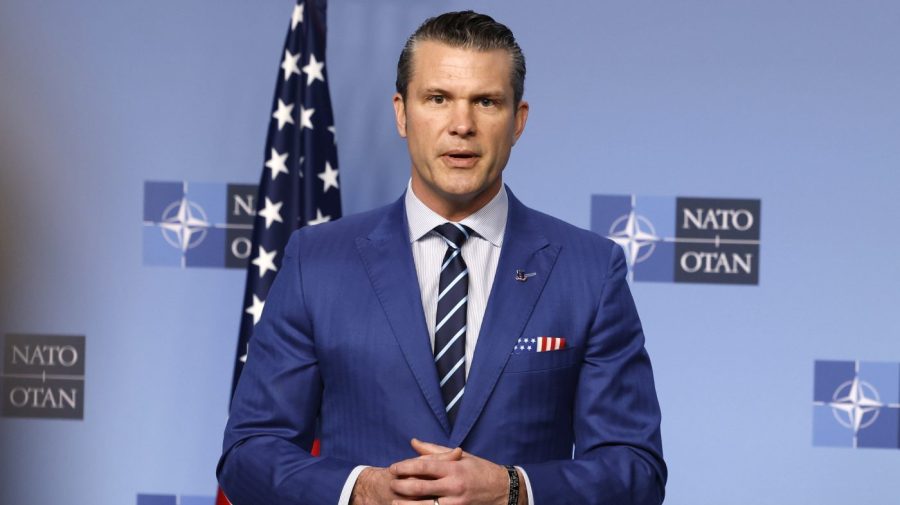
Defense Secretary Pete Hegseth on Thursday responded to global blowback to his comments this week that Ukraine should not expect to join NATO or return to it’s pre-2014 borders as President Trump seeks to kickstart negotiations with Russia over the war.
Hegseth, who spoke to reporters following a NATO Defense Ministerial in Brussels, appeared to walk back his comments from Wednesday, when he said it’s not “realistic” for Ukraine to join NATO, saying Thursday “everything is on the table” in negotiations with Kyiv and Moscow.
“I want to be clear about something as it pertains to NATO membership not being realistic outcome for negotiations. That’s something that was stated as part of my remarks here, as part of the coordination with how we’re executing these ongoing negotiations,” Hegseth said.
“These negotiations are led by President Trump. Everything is on the table. In his conversations with [Russian President] Vladimir Putin and [Ukrainian President Volodymyr] Zelensky. What he decides to allow or not allow is at the purview of the leader of the free world — President Trump.”
Hegseth in opening remarks before the Ukraine Defense Contact Group meeting on Wednesday said he does “not believe that NATO membership for Ukraine is a realistic outcome of a negotiated settlement,” and that Ukraine will not get all its territory back from Russia. It’s unclear where the Trump administration stands on territory that has been occupied by Russia since it’s full invasion three years ago.
Trump later that day declared he had called both Putin and Zelensky to push to begin negotiations to end the war, but that he also does not “think it’s practical” to have Kyiv join NATO — a security guarantee that would help ensure that the Kremlin doesn’t move to attack Ukraine in the future.
Critics quickly lept on the comments, suggesting that the Trump administration took away some of Ukraine’s leverage even before negotiations begin.
But Hegseth on Thursday rejected the criticism, saying that pointing out realities is not making concessions.
“I think realism is an important part of the conversation that hasn’t existed enough inside conversations amongst friends,” he said. “But simply pointing out realism — like the borders won’t be rolled back to what everybody would like them to be in 2014 — is not a concession to Vladimir Putin. It’s a recognition of the hard power realities on the ground after a lot of investment and sacrifice . . . and then a realization that a negotiated peace is going to be some sort of demarcation that neither side wants.”
Multiple European leaders have also raised concerns about the way negotiations will be organized, insisting that both Ukraine and Europe must be represented.
European Union foreign policy chief Kaja Kallas said any agreement brokered by the United States alone “will fail because you need Europe and Ukraine to also implement the agreement.”
“Any quick fix is a dirty deal,” she added.
And Zelensky said Thursday that Ukraine would not accept any agreement reached without its involvement, also calling for Europe to have a seat at the table.
Questions also were raised as to whether the U.S. will continue to supply Ukraine with both lethal and humanitarian aid, with Hegseth appearing to link future funding for Kyiv to their willingness to negotiate with Moscow.
“We have continued to provide what has been allocated,” Hegseth said, referring to security assistance promised during the Biden administration. “I think it would be fair to say that things like future funding — either less or more — could be on the table in negotiations as well.”
He added that the outcome will be “whatever the president determines is the most robust carrot or stick on either side to induce a durable peace.”
As far as any long-term relationship between Washington and Kyiv, Hegseth said Trump believes that an “investment relationship” with Ukraine is “a lot more tangible than any promises or shared values we might have — even though we have them,” likely referring to the administration’s interest in Ukraine’s rare earth minerals resources.
Hegseth also reiterated Trump administration calls for NATO allies to drastically increase their defense spending, saying the alliance “can’t endure on the status quo.”
“We understand the importance of that partnership, but it can’t endure on the status quo forever. In light of the threats we face and fiscal realities, Europe has to spend more. NATO has to spend more, has to invest more,” he said.
NATO countries in 2014 agreed to work toward committing 2 percent of their gross domestic product to defense spending for the alliance’s military readiness.
But Trump in his first term frequently lamented that allies were not pulling their full weight, insisting that 2 percent should only be the start of their commitment.
“Leaders of our European allies should take primary responsibility for defense of the continent,” Hegseth said. “That begins with increasing defense spending. 2 percent is a start, as President Trump has said, but it’s not enough. Nor is 3 percent, nor is 4 percent, more like 5 percent. Real investment, real urgency.”
Hegseth on Wednesday sparked fears as to whether the U.S. would largely abandon investment in NATO moving forward after he expressed “that stark strategic realities prevent the United States of America from being primarily focused on the security of Europe.”
“The United States faces consequential threats to our homeland. We must, and we are, focusing on security of our own borders,” he said.












